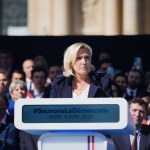Marine le Pen is far from finished
The right rarely take to the streets in France, but thousands gathered in Paris on Sunday to hear Marine Le Pen pledge to continue the fight. The leader of the National Rally was convicted of embezzlement last week, and among her punishments was a five-year political disqualification. She told her supporters she was a victim of a ‘witch-hunt’ and they roared their agreement. Le Pen had assembled her MPs and supporters in the Place Vauban, in the shadow of the Hôtel des Invalides, built by Louis XIV as a retirement home for old soldiers. In the days leading up to the rally, some of Le Pen’s political adversaries had warned





















